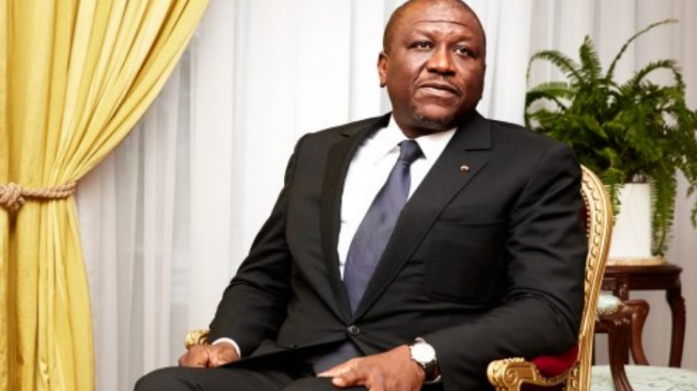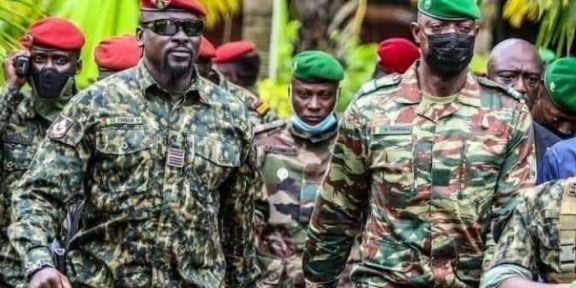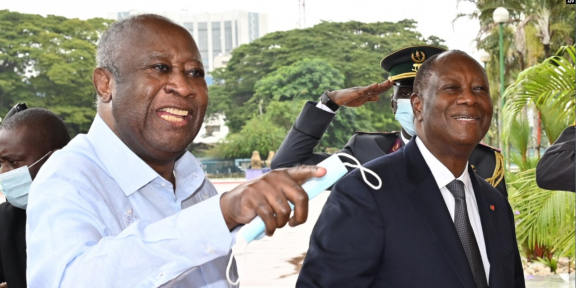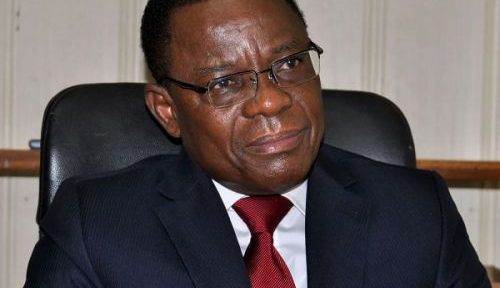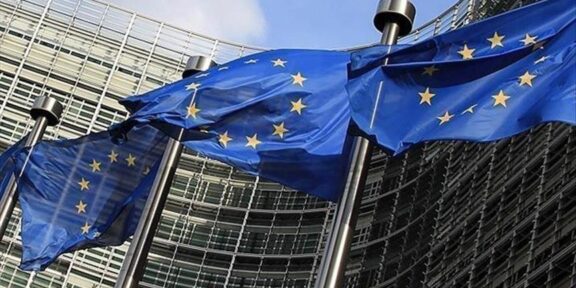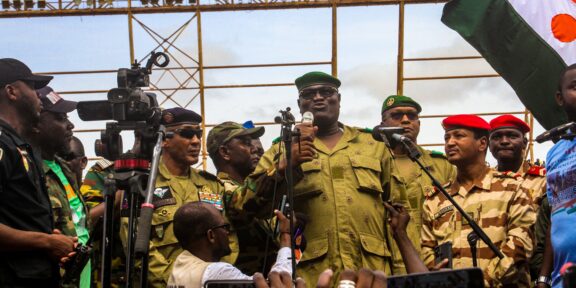Hospitalised in Germany, Côte d’Ivoire’s prime minister Hamed Bakayoko died on 10 March. Sister magazine Jeune Afrique’s publication director Marwane Ben Yahmed, who had a close relationship with him, recounts his final weeks and pays tribute to him.
To be honest, writing this piece is extremely difficult for me because Hamed Bakayoko and I were friends for 20 years. He was almost like a brother to me. We were always careful to keep our professional and personal relationships separate.
Our friendship never influenced my reporting on him as a journalist or how he interacted with me as a political leader. We both scrupulously respected this pact, despite a few hiccups along the way and the need for frank discussions.
Our families spent this past Christmas and New Year’s together. We knew each other’s lives down to the smallest detail, spending hours – sometimes whole nights – discussing life, love, politics, humanity, family, our happiness and our problems. It brings tears to my eyes remembering this rare friendship, but we have to soldier on, to bury the pain and sadness so that we can pay tribute to this man who is no longer here. My tribute will probably not be very objective, but it will be sincere and honest.
There was no clear explanation for the sudden deterioration in his state of health, and even less for this outcome. A fast-acting cancer claimed the life of this 56-year-old man, who died too young.
During the holidays and the New Year spent at his home in Assinie, Bakayoko didn’t display any signs of illness. Perhaps he was more tired than usual, but this was to be expected. After all, it had been a particularly intense and painful year, which had been marked by the death of former prime minister Amadou Gon Coulibaly as well as by a particularly tense presidential campaign, during which he had played a central role.
He had then been appointed President Alassane Ouattara’s prime minister and had spent the year working around the clock on all fronts.
Last moments of respite
Bakayoko, who was hit by Covid-19 twice and also by malaria, was not in the best of shape. However, he was in excellent spirits, happy to finally be spending quality time with his wife Yolande, his four children and a host of cousins. And with my wife, my three kids and myself who were discovering Côte d’Ivoire.
At the beginning of the month, he came to spend a few days at his home in Neuilly with Yolande. This was his last break before the electoral marathon, a hiatus from what was happening in Abidjan and his mobile phone, which was constantly ringing. He took advantage of this time off to undergo tests at the American Hospital of Paris because, he said, he had regular bouts of fatigue that did not go away.
Worse, they were increasing. Duty called, so he then headed back to Abidjan. At the end of January, he then returned to Paris for more medical appointments. He was accompanied by Nestor, his faithful butler who watched over him as if he were the apple of his eye, and Idriss Karamoko, one of his closest friends. He was suffering from anemia as well as fatigue and ate very little, even though he was usually a bon vivant.
Assumptions and rumours
I visited him on 29 January at his home in the middle of the afternoon. He made an exception for me, as he was trying to take care of himself and rest as much as possible. Immediately, I could see that something was wrong: his features were drawn and he had become very thin. He had easily lost six or seven kilogrammes since our time together in Assinie. I had never seen this man, usually so active, look so fragile. “I’ve run out of juice,” he said. “I can’t concentrate anymore, I’ve never been like this.”
I made some assumptions regarding his condition, perhaps he was suffering from burnout, the after-effects of Covid-19, a virus or tropical parasite, anything was possible. “What’s strange is that Nestor fell ill at the same time as me. We thought it was malaria. He lost more than 10kg,” he said. They both ate the same food.
I asked if he thought he may have been poisoned. This rumour was rife in Abidjan, but he didn’t believe it. I then left, as I could tell he was tired. As I got up to leave, he said to me: “Don’t worry, it will pass. I just need to rest. See you in Abidjan.”
On the afternoon of 18 February, Bakayoko (aka “Hambak”) left Abidjan – where he had just returned a fortnight ago – for Paris once again, onboard a Grumman 5 of the presidential fleet. His condition had worsened and President Ouattara could see that his prime minister could no longer cope.
His last official appearance was on 10 February, during a meeting of the Rassemblement des Houphouëtistes pour la Démocratie et la Paix (RHDP) in Abobo, where he was mayor. He did not even have the energy to participate, six days later, in the official presentation ceremony of the party’s candidates for the legislative elections.
The President then removed him from his duties and requested that he go to Paris to rest and recuperate. There was no cause for alarm at the time, so he did not officially appoint an interim premier. Patrick Achi, the secretary general of the presidency, and Fidèle Sarassoro, Ouattara’s chief of staff, took over Bakayoko’s duties.
Total blackout
On 19 February, at noon, we published an article explaining that Bakayoko had gone to France for medical reasons. He didn’t appreciate this and called me up to complain, barely two hours after its publication. When I picked up the phone, I didn’t recognise his voice.
It was hoarse and weak, as if he’d aged 20 years overnight. “Why are you doing this? People don’t need to know all this. Protect me.” I told him, awkwardly, that since he was the prime minister, everyone was wondering where he was and that we were simply doing our job.
He and I had often had this debate, one on one, about the transparency that politicians should show. The conversation lasted barely two minutes. I could hear that he was exhausted and no longer had the strength to argue. I cut it short by hanging up. Two days later, we spoke again on the phone.
He seemed to be getting better, his voice at least sounded better. I told him how worried I was, how I couldn’t understand how after so many tests, blood tests and scans that his doctors still hadn’t figured out what disease was eating away at him. I didn’t know then that he was suffering from cancer.
His answer left me dumbfounded: “All I ask of you,” he said, “is that your thoughts be with me. Be with me in spirit, think of me, I’ll take care of the rest. I need to cut back, stop answering the phone and concentrate on my health. I know you’re there, that’s the main thing.”
Concern within Côte d’Ivoire had been growing ever since our last conversation. Only a very small circle of insiders – which included Yolande, the country’s presidential couple and France’s President Emmanuel Macron – knew for certain the state of Bakayoko’s health.
“He is better,” some said. “It is very serious, and his life is at risk,” said others. Who should we turn to, when there is a total information blackout? How long had Hamed known from which disease he was suffering from? Did he think he could be cured?
The death sentence, for me, came at the beginning of March. “Hambak” was hospitalised at the American Hospital in Neuilly-sur-Seine with metastasised liver cancer, which was in its terminal phase. The only option was an emergency transplant. The best establishment for this was the Kremlin-Bicêtre hospital.
But the experts at his bedside said it was too late and that he could no longer be operated on. Yolande could not bring herself to give up just yet. She was determined to try everything, even if there was only one chance in a million of saving him. Yalonde decided, alone, that she would have him be operated on elsewhere and settled on Turkey.
A shock
A plane was dispatched to Paris in the evening on the instructions of President Recep Tayyip Erdoğan. It picked up Bakayoko and the few people accompanying him so that he could be operated on in Turkey. Hope was reborn, but the prognosis remained dire. If the transplant was not performed within 24 or 48 hours, it would be the end.
While the transfer was expected to take place that very night, by 5 March Bakayoko had still not left Paris. The doctors in Istanbul confirmed their French colleagues’ diagnosis: the patient was no longer operable, let alone transportable.
But on the morning of 6 March, there was a new twist: he was transferred to Germany to undergo an experimental treatment. He fought until his last breath, but the battle was lost before it had even started. Liver cancer diagnosed late is never forgiving.
This was a shock for his family and friends, of course, but also for Ouattara, who had seen his two “spiritual sons”, the latest prime ministers and designated successors, die within less than eight months of each other. It is also a huge loss for Côte d’Ivoire, because Bakayoko was a rare person, especially in politics. He was a good and honest man.
Bakayoko was fascinatingly open-minded, a ‘sponge’ constantly seeking personal progress, eager to learn every day. He was able to read each one of us as if we were an open book and didn’t care about allegiances, ethnicities or social categories.
He could hold a frank and sincere conversation as easily with the King of Morocco, Mohammed VI, as with a peanut seller in the street and be as comfortable in a Parisian palace as in a Yamoussoukro maquis. Bakayoko was a self-made man from a modest background who had gotten to where he was on his own.
He began as a student trade unionist, founder of the newspaper Le Patriote, owner of Nostalgie – the country’s first private radio station – and worked his way up to minister of new technologies after the Marcoussis agreements, minister of the interior in 2011, then of defence after the mutinies of 2017 and finally, prime minister from mid-2020.
Bakayoko, who was born in Adjamé, was even seen as the great favourite to succeed Ouattara in 2025. Who would have believed it, only 10 years ago? Fate, oh so cruel, decided otherwise.
As I write these lines, a memory of our last shared moments, on the terrace of his villa in Assinie, comes back to me. “You know,” he said to me as he sipped his herbal tea, “we really have to make the most of every moment, as if it were our last. Focus on the essentials. We are both very lucky, we have everything to be happy, but we don’t stop to think about it enough. We waste time on trivialities, so-called obligations, bickering, jealousy, we give importance to things that have no importance. But all it takes is one breath, like an illness, an accident or a tragedy, and it’s all over!” Only two months were enough to prove him right.
I now realise today that he knew, at that time, that he had been suffering from cancer for several months. He kept it to himself, out of modesty, so as not to worry anyone. No doubt he thought he would beat it. For once, alas, he found something stronger than himself.
Source: The Africa Report

